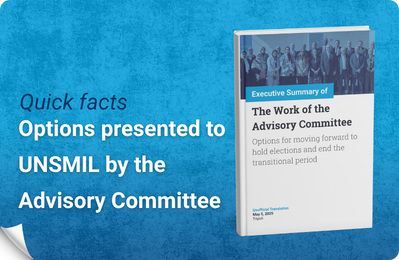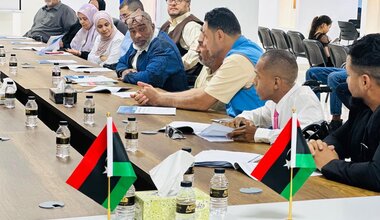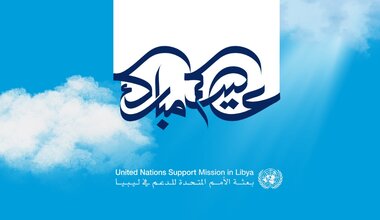Near verbatim Remarks of ASRSG Stephanie Williams opening remarks during the virtual meeting of the LPDF on 30 December 2020
Thank you for joining me today and once again for your patience meeting on Zoom. I would like to congratulate you again on marking Libya’s Independence Day on the 24th of December and that is now an ever more important date, given that it marks one-year to national elections, which you agreed in the Tunis meeting.
I would also like to extend a warm welcome to Mr. Tareq Abou Hessa who has joined the dialogue, he is filling the position vacated by our dear departed Omar Ghaith Garmil from the electoral district 8. Tareq is with us here today and we appreciate his participation in the dialogue. Our thoughts remain with Omar’s family and community as they pass through this difficult period.
Thank you Zahra for the comprehensive briefing on the work of the legal committee which held several meetings, and I really want to thank also all the members of the legal committee; I have attended the sessions and this is a very serious endeavor. What they are doing constitutes important progress in the dialogue process and I also want to thank Dr. Imad Sayeh (Head of HNEC) who has devoted a lot of time to the interaction with the legal committee, with the dialogue as a whole, and he is committed to that in the future and I think that all of the institutions are going to be very critical for moving forward, so that we continue to honour the commitment for this electoral calendar we have set for the 24th of December 2021, and the new year is literally around the corner.
I want to start the discussion today by noting that there has been some positive progress on the various tracks. We’ve heard from the legal committee, we have also seen during the period of marking Libya’s independence day that there was an exchange of detainees that was really spearheaded by the 5+5 Joint Military Commission, and even as I speak there is news of another exchange of detainees that is maybe underway and that is also extremely encouraging. I think that these kinds of confidence building measures really help us to build the necessary trust across the different lines that are dividing your country right.
I am in in daily contact with the JMC. I am hopeful that we are going to see some progress also on the reopening of the coastal road between Misrata and Sirte which we know is so important for your compatriots, for Libyans who want to be able to move across the country and for the delivery of goods and services. I really want to commend the 5+5 JMC members for their persistence and indeed for their insistence on ensuring that the ceasefire agreement signed in Geneva on October 23 is fully implemented.
We have also seen some good progress on the economic track. Some subcommittees of the economic track met over the last week before the holiday.
There is also intense follow-up on the meeting of the Board of Directors of the Central Bank on the exchange rate reform. These critical reforms that we are seeing unfold on the economic track do need a lot of follow-up and we have this meeting that took place in Geneva at a high technical level between the various institutions and that will also continue.
On the political front, I must remind you once again that the clock started on 21 December, setting clear timelines outlined in the road map which you have adopted in Tunis and for which I congratulate you again. The election date of 24 December 2021 and the path to these elections are an irrevocable achievement and goal from which we will not retreat. I want to emphasize that.
We are witnessing incremental progress in the three intra-Libyan tracks and they do and must continue to complement each other.
There is no doubt in my mind that sustaining the progress in all the tracks would be greatly assisted if Libya had a unified executive authority. And there is no doubt that the path to elections will also be facilitated by a unified executive, not to mention the fact that it will greatly enhance and facilitate the much-needed delivery of services to municipalities, many of which are now completely starved of resources.
Now comes the hard part and I have spent a lot of time with all of you collectively, I have spoken to many of you individually and I have participated in the committee meetings. I am always honoured to be part of your discussions. I have been a direct witness to genuine expressions of fears, of the lack of trust, of the need to build bridges, of what could be described as a crisis of confidence among key political actors represented here in this forum, but also outside of this room. Yet, somehow, I must now ask you to challenge yourself to overcome this crisis.
Change is hard. It requires a degree of courage, of selflessness, and of looking beyond parochial interests, looking beyond personal interests and I know that you all have a great spirit of patriotism. I continue to believe that this process will not be able to advance further, will not be able to succeed if the approach that is taken towards these important deliberations is represented by a zero-sum calculus where there are clear winners or losers. That is a formula for lose-lose. I believe that what Libya urgently need now for this very defined period – we are under a year now leading to elections - is not a power sharing formula but a formula of sharing responsibility that will take you to these elections.
I also know that the status quo, which is characterized by this institutional division, by this systemic dysfunction, and now this entrenched foreign intervention, is not an alternative.
We can’t engage in a continuing open-ended process. We have a clear goal, the elections; there is a clear need for the unification of institutions. Yet, we have been facing this lack of progress on achieving an acceptable level of consensus on a mechanism to select the executive authority.
Therefore, in my role as the Mediator, with a clear mandate from the UN Security Council, I have a professional, personal and moral obligation to address this blockage, preserve this process, and to help lead you to an acceptable compromise which will contribute to achieving the electoral goal, which is the ultimate goal.
And here I must thank many of you who have reached out with suggestions on the way forward; I must thank those of you who are really working hard to build bridges and to foster an atmosphere of compromise. I really commend you for these efforts.
It is in this spirit that I have decided that we need to form an advisory committee that will be composed of 15 members of the Dialogue, that will assist us/you in reaching consensus on these contentious issues. I will give you two days, from today, until Friday evening, to put forward or reconfirm your nominations for this committee and we will quickly start to work on. The nominations should be supported by 3 signatures and the Mission will then finalize the membership of the committee keeping in mind the need to balance all of the different constituencies, including gender balance, youth and different ethnic components representation. Friday evening will be the deadline for the nomination to come in, we will then finalise the membership of the committee.
The work of this committee will be time-bound. We do not want an open-ended process here. Because it is going to be a time-bound process, I will give the committee two weeks to discuss the outstanding issues and put forward concrete, real recommendations for the plenary to decide upon. Therefore, the committee will have an advisory role.
I am now calling on you individually to show a bold spirit of consensus and willingness to compromise. We all collectively must rise to this task for the sake of your compatriots, your fellow citizens, brothers, sisters, daughters and sons.
I am asking you this now because, time is a luxury which you simply can no longer afford in this process, especially if what you want – and I believe this is what you want- is truly a made-in-Libya solution. What you don’t want to risk is a solution made outside of Libya and somehow imposed on you, and I am sure there are some who may naively believe that they could benefit, or maybe a group could benefit, from such a solution that would be made elsewhere but ultimately I think that is selling out Libya’s sovereignty and I truly believe that you can make this solution a Libyan solution. Please help yourself in that regard.
Thank you and I hope that you take my suggestions on the way forward in the spirit in which truly to help sustain and move this process forward.
 United Nations Peacekeeping
United Nations Peacekeeping UN
UN








